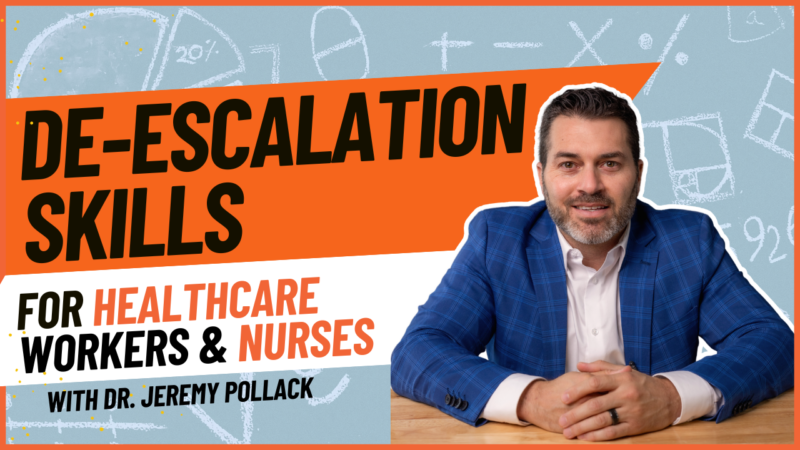Table of content
In the realm of mental health, de-escalation techniques are crucial tools for professionals navigating challenging situations with clients who may exhibit escalated behavior due to mental illness. According to a 2019 ANA Survey, 25% of nurses experience workplace violence, thus the need for effective de-escalation training in healthcare settings. These strategies are pivotal in preventing a scenario from worsening, ensuring both the safety and the psychological well-being of all involved.
Medical Definition of De-Escalation
Essentially, de-escalating a conflict means reducing the intensity of a confrontation or emotional outburst for patients with mental illness. This is particularly important in mental health settings, where escalated situations can hinder therapeutic outcomes. De-escalation training for mental health caregivers equips them with the necessary skills to manage and calm down tense interactions, often by understanding and adapting to the psychological underpinnings of the conflict.
A key principle of de-escalation is to acknowledge and respect personal space. Intruding into a client’s personal space can heighten their anxiety, making it essential to keep a respectful distance to prevent escalating their distress.
Additionally, it’s important to recognize that some people have trouble identifying their feelings or communicating them effectively. Mental health specialists need to be adept at reading non-verbal cues and responding appropriately to them without escalating the situation further.
A study from the 2014 California Well-Being Survey highlights the importance of respectful communication in mental health care, finding that providers who showed respect and explained things clearly were associated with better recovery outcomes, including increased connectedness, hope, empowerment, life satisfaction, and reduced internalized stigma.
Effective de-escalation also requires clear limit setting, which plays a critical role in maintaining safety and reducing the likelihood of aggression in mental health settings. According to a qualitative study involving nurses and patients, limit setting is most effective when it is done in an authoritative manner, characterized by being fair, respectful, consistent, and knowledgeable, rather than authoritarian, which can be perceived as controlling or indifferent.
The study emphasizes that engaging patients empathetically while setting boundaries helps preserve the therapeutic relationship and reduces the risk of aggressive responses.
The Importance of De-escalation Training for Mental Health Professionals
De-escalation training is not just beneficial but essential for anyone in healthcare, especially for those working with individuals experiencing mental illness.
Enhances Safety
De-escalation training provides mental health practitioners with the tools necessary to safely manage and defuse potentially volatile situations. This not only ensures the safety of the staff but also protects the patients, often reducing the need for physical interventions, which can be traumatic.
Improves Therapeutic Outcomes
By employing effective de-escalation skills, professionals can maintain a calm environment conducive to therapy and recovery. Training helps staff recognize and respond appropriately to a person’s feelings and behaviors, which is pivotal in fostering a supportive therapeutic relationship.
Reduces Stress and Burnout
Learning how to remain calm and manage intense situations can significantly decrease work-related stress. Mental health workers who are equipped with de-escalation techniques are better able to manage their own stress levels, leading to lower rates of burnout and higher job satisfaction.
Promotes a Culture of Compassion
De-escalation training reinforces the importance of empathy and understanding in the treatment of mental health. It teaches staff to set limits respectfully and supportively, which promotes a culture of compassion rather than control, aligning with modern best practices in mental healthcare.
Understanding Crisis Situations and Triggers
In mental health, recognizing and understanding the triggers that lead to crisis situations is essential for effective crisis intervention. A study investigating the psychological effects of trigger warnings found that participants who received warnings before encountering potentially distressing content reported greater anxiety if they believed that words could cause harm.
While trigger warnings were initially designed to help individuals, particularly those with PTSD, prepare for or avoid distressing material, the study suggests they may inadvertently reinforce feelings of vulnerability and increase anxiety in certain contexts.
These triggers can vary widely but typically involve stimuli or experiences that provoke a significant emotional response.
Personal History Triggers
Individuals with mental health challenges often have specific triggers rooted in their personal history. These can include:
- Anniversary dates of traumatic events
- Encounters with individuals associated with past trauma
- Situations that resemble a past traumatic event
When these triggers are activated, a person’s behavior may change abruptly, making it crucial to recognize and understand these personal history triggers for effective management.
Environmental Triggers
Places, situations, or environments can evoke distress and lead to a crisis. Crowded spaces, loud noises, or specific locations tied to a person’s traumatic memories can trigger a response. This understanding helps in planning safer environments that minimize the risk of triggering a crisis.
Interpersonal Triggers
Interactions with others can also be significant triggers, especially if they involve conflict, rejection, or abandonment. These situations can be particularly provocative for someone with a history of relational trauma or sensitivity to social rejection. Noticing changes in feelings and behavior during interpersonal interactions can provide insights into potential interpersonal triggers.
Recognizing Signs of Agitation and Distress
Understanding and identifying early signs of agitation and distress are pivotal in mental health care, particularly for effective de-escalation. Tools like STAMP (Staring, Tone, Anxiety, Mumbling, Pacing) and the Broset Violence Checklist are valuable resources that help professionals recognize signs of agitation early.
Recognizing these signs helps professionals intervene promptly, potentially averting unnecessary altercations and ensuring the safety and well-being of individuals in distress.
Physical Signs
One of the first observable signs of agitation can be physical changes. This includes pacing, restlessness, or other repetitive movements. An agitated patient might also exhibit physical behaviors like clenching fists or tightening jaw muscles, signaling rising tension or distress. These signs indicate a need for space and a quieter environment to help de-escalate the situation.
Verbal Cues
Changes in speech patterns, such as an increased volume or speed of talking, can indicate escalating distress. The content might also shift toward more negative or aggressive themes. Recognizing these changes in speech allows mental health specialists to gauge the person’s anxiety and emotional state accurately.
Changes in Behavior
A deviation from usual behavior, such as sudden withdrawal from social interaction or refusal to engage in regular activities, can be a sign of internal turmoil. These behavioral changes often reflect the internal struggles and feelings the person is experiencing, which might not be immediately visible through their physical demeanor.
What to Do to De-escalate Conflict in Mental Health Patients
De-escalation is a critical skill for managing conflict and ensuring the safety of both mental health workers and patients.
1. Strategies for Defusing Aggression and Promoting Calmness
When a mental health patient shows signs of agitation or aggression, the first step is to identify the cause of the behavior. This understanding can guide appropriate responses that address the root of the issue rather than just the symptoms.
Respect personal space to avoid increasing the patient’s stress or anxiety, which can inadvertently lead to violence. It’s also helpful to ignore challenging questions that may escalate tension and focus instead on acknowledging the feelings expressed by the patient and other patients who might be affected by the situation.
2. Active Listening and Effective Communication Skills
Verbal de-escalation is profoundly rooted in how well you listen closely to the patient. Active and empathetic listening is key to understanding the patient’s behavior and underlying emotions.
By giving full attention and responding with empathy, you validate their feelings and concerns, which can significantly reduce the intensity of the situation.
3. Non-verbal Techniques for De-escalation
Non-verbal cues play a substantial role in de-escalation. Body language that shows openness and is non-threatening, such as uncrossed arms and a relaxed posture, helps to create a safe and calming environment.
A significant factor in nonverbal communication is to keep your body language neutral and use facial expressions that convey genuine interest in what the patient is expressing. This nonverbal communication reassures the patient that you are engaged and care about their feelings, which can help diffuse potential conflicts.
Creating a Safe and Supportive Environment
Creating a safe and supportive environment in mental health settings is crucial for both patients and healthcare providers.
Enhance Psychological Safety
Establishing a psychologically safe environment where staff and patients can express themselves without fear of negative consequences is vital. This involves cultivating trust and respect within teams, which encourages open communication and continuous improvement. Supportive leadership plays a crucial role in modeling these behaviors and setting the tone for an inclusive culture.
Physical Environment Considerations
The physical layout of the setting should promote safety and comfort. This includes having secure but welcoming spaces that allow for privacy when needed and safe places where patients can engage in therapeutic activities without feeling threatened. Creating such an environment reduces stress and helps in managing situations where behavior may become challenging.
Policy and Staff Training
Implementing clear policies that prioritize safety and de-escalation skills is essential. Training all staff, including police officers and security personnel who might interact with patients, ensures that everyone is equipped to handle crises effectively. Training should focus on conflict resolution, understanding the person’s behavior, and the best practices for intervention.
Empowerment Through Choices
Allowing patients some level of control over their daily activities can significantly enhance their comfort and cooperation. If you can offer a person options, it helps in reducing frustrations that might arise from feeling powerless.
Moreover, if a situation escalates, seek additional support from nursing professionals and other staff trained in crisis intervention to help de-escalate effectively.
Managing Challenging Behaviors and De-escalating Conflicts
In mental health care settings, managing challenging behaviors and de-escalating conflicts are critical components of care. These efforts ensure the safety and well-being of both patients and healthcare providers.
Stay Calm
One of the fundamental principles in dealing with challenging behaviors is to maintain composure. Staying calm helps prevent the situation from turning into a more volatile situation. It sets a tone that can help soothe the patient and makes it easier to apply de-escalation techniques effectively.
Ignore Challenging Questions
Sometimes, patients may pose provocative or challenging questions that serve more to test boundaries than to communicate genuine concerns. It’s important to recognize these and choose not to engage with them directly, as this can help avoid unnecessary altercations.
Use Crisis Intervention Techniques
Effective crisis intervention strategies involve:
- Assessing the situation quickly
- Determining the level of threat
- Responding appropriately
This might involve talking down a patient who is becoming aggressive or using gentle physical interventions as a last resort if they pose a danger to themselves or others.
The Dix and Page Model emphasizes assessment, communication, and tactics as key components of de-escalation. Alternatively, the Safewards Model takes a linear approach, starting with situational delimitation, followed by effective communication, and culminating in resolution.
Provide Concise and Respectful Choices
When de-escalating a tense situation, offering concise and respectful choices gives the person a sense of control over what happens next. This can be particularly calming and can encourage cooperation rather than conflict.
Training and Policies
Ensure that all staff, including police officers who might be called into extreme situations, are trained in specific de-escalation strategies tailored to mental health care. Training should focus on recognizing the early signs of agitation and applying de-escalation techniques before situations reach a crisis point.
Self-care for Mental Health Workers
Mental health specialists can practice self-care by incorporating the following general principles into their routine:
- Mindfulness and Relaxation: Dedicate a few moments each day to mindfulness exercises, meditation, or deep breathing to manage stress and maintain emotional balance.
- Physical Health: Engage in regular physical activity and maintain a nutritious diet to support overall well-being.
- Professional Support: Seek therapy or support groups to process personal anger and challenges, ensuring emotional resilience.
- Leisure and Rest: Prioritize downtime and hobbies to rejuvenate and prevent burnout.
- Peer Support: Regularly connect with colleagues to share experiences and coping strategies, fostering a supportive professional network.
Enhance Safety With Defuse
At Defuse De-escalation Training, we offer specialized verbal de-escalation training programs tailored to various industries, including mental healthcare. Our training helps manage anger, fear, and violence effectively. For additional resources or to start your training, contact Defuse today and ensure a safer workplace.
References
- American Nurses Association: Workplace Violence
- BMC Psychiatry: Associations between provider communication and personal recovery outcomes
- PubMed: Exploring nurses’ and patients’ perspectives of limit setting in a forensic mental health setting
- ScienceDirect: Trigger warning: Empirical evidence ahead
- PubMed: STAMP
- PubMed: Broset Violence Checklist
- The Joint Commission: De-Escalation in Healthcare






